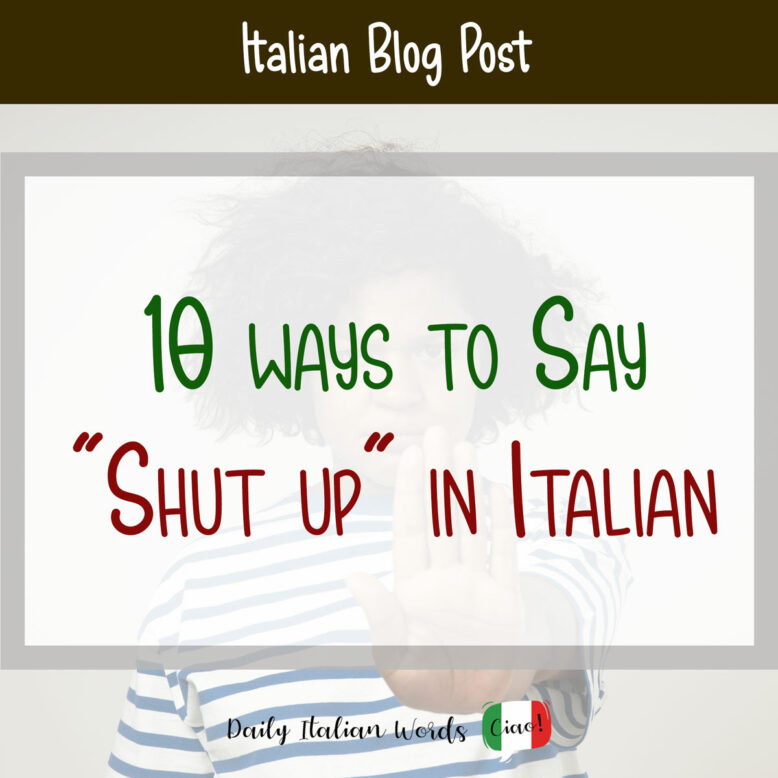Sometimes, nothing beats a little silence, right? I mean, who hasn’t daydreamed about a little peace and quiet every now and then, wishing you could hit the “mute” button on the world around you?
In Italian, there are various ways to ask someone to be quiet, ranging from polite and playful to downright stern for those serious moments. Whether you’re handling a group of noisy kids, tactfully shushing a verbose friend, or dealing with a rude stranger, there’s a phrase for every situation.
So, let’s dive in and explore 10 effective ways to say “shut up” in Italian, along with some handy tips on when to use each expression so you get it just right.

1. Stai zitto!
Literally: Shut up!
This is the standard translation for “shut up” in Italian and it’s as direct as it sounds. It combines the imperative form of the verb stare (to stay) with the adjective zitto, meaning “silent” or “quiet.”
The expression must be adjusted based on the gender and number of the person you’re addressing:
- Stai zitto – masculine singular
- Stai zitta – feminine singular
- State zitti – masculine plural
- State zitte – feminine plural
In formal contexts, where a polite form of “you” is required, you’ll need to switch to:
- Stia zitto – masculine singular
- Stia zitta – feminine singular
- State zitti – masculine plural
- State zitte – feminine plural
Lei stia zitta, non deve intromettersi!
Please shut up, you shouldn’t interfere!
This phrase is not the kind of thing you’d casually throw into everyday chit-chat. It’s more of an in-the-heat-of-the-moment statement, especially when tensions are high. So, save it for those dramatic family dinners or heated debates with close friends. Don’t be out there telling your boss Stia zitto unless you’re ready to deal with the consequences!
There are quite a few variations of Stai zitto that you might encounter:
- Sta’ zitto! – a contraction of stai, with an apostrophe after sta.
- Statti zitto – a common regional variation in southern Italy
For instance, a classic phrase Italian mothers use to encourage their children to focus on eating rather than talking too much during a meal is:
Zitto e mangia!
Shut up and eat!
The adjective zitto is also found in certain idiomatic expressions you may come across in everyday Italian:
- Zitto e mosca! (lit. Silence and fly) means “Don’t say a word!” and you might even see someone placing a finger on their nose while saying it. This expression is also the title of a super cute song by the Piccolo Coro dell’Antoniano kids choir (link here)!
- Zitto zitto (lit. Silent, silent) suggests that someone did something on the sly, without attracting attention. For example: Zitto zitto, Giovanni ha messo su un impero! (Quietly, Giovanni built an empire!).
2. Silenzio!
Literally: Silence!
Silenzio is the most common expression to convey “shut up” in Italian. It’s pretty versatile and can fit right into any situation where a little peace and quiet is called for, from movie theaters to oh-so-serious meetings.
Think of it less as an harsh command and more as a firm yet measured request, though its impact often depends on the tone in which it’s delivered. Spoken softly and politely, it’s a courteous appeal for silence:
Silenzio, per favore. Lo spettacolo sta per iniziare.
Silence, please. The show is about to begin.
On the other hand, if the situation’s spiraling into chaos, you can crank up the volume and make your point crystal clear:
Silenzio! Non si sente nulla!
Silence! We can’t hear anything!
Silenzio can be used on its own when the call for quiet isn’t directed at anyone in particular. However, if you’re trying to shush someone specific, you might say Fai silenzio (Be quiet!) or Fate silenzio (Be quiet, you all!).

3. Taci!
Literally: Be silent!
Taci is the imperative form of the verb tacere, which means “to stop talking” or “to be silent.” This expression is a little less common: strict, yes, but with a certain chic flair. Imagine a classy lady in a perfectly tailored outfit coolly saying the following in a firm but graceful way:
Taci e ascolta, invece di parlare sempre a vanvera!
Be quiet and listen, instead of always talking nonsense!
In any case, use this expression wisely because when dropped in the wrong situation, it might come off a bit sharp.
There are also a couple of Italian sayings that use this word, for instance:
- Taci che buona vita fai (lit. Shut up and you’ll live well), suggesting that it’s often better to mind your own business and keep silent if you want to lead a peaceful life.
- Bocca mia taci! (lit. My mouth, shut up!) is for when you need to remind yourself to hold your tongue before you say something you’ll regret.
And here’s a fun fact for all the poetry lovers: Taci is the very first word of one of the most famous Italian poems, La Pioggia nel Pineto (The Rain in the Pinewood) by Gabriele D’Annunzio. See, I told you this word carries a certain elegance!
4. Muto!
Literally: Mute!
The word muto is an Italian adjective that means “mute” or “silent.” It’s a firm, somewhat intense way to tell someone to be quiet, often carrying an air of authority. Use it with caution, as it can sound aggressive. Think of it as the verbal representation of a stern look. Italian mums know this one well, often throwing it out when their little darlings start talking back:
Muto, devi stare muto!
Silent, you have to stay silent!
There’s also a well-known Italian idiom involving this word: muto come un pesce (lit. mute as a fish). This phrase is used to describe someone who is completely silent, either because they don’t want to speak or because they know it’s wiser to remain quiet in that situation:
Non stare lì muto come un pesce, dicci cosa ne pensi!
Don’t just stand there mute like a fish, tell us what you think!

5. Chiudi quella bocca!
Literally: Close that mouth!
This phrase is another way to say “shut up” in Italian that is not particularly polite, although it sits on the line between cheeky and sassy, making it perfect for playful exchanges with friends or family. Just remember, the key is in how you say it.
Chiudi quella bocca, sto pensando!
Shut your mouth, I’m thinking!
If things get heated and you need a much stronger version, you can use Chiudi quella cazzo di bocca (Shut your fucking mouth). This version is extremely rude and includes the swear word cazzo (meaning “fuck”), so it’s best to avoid using it unless you’re prepared for strong reactions!
For a less offensive alternative, you can substitute cazzo with cavolo (lit. “cabbage”), which is a common way to soften harsh language in Italian: Chiudi quella cavolo di bocca (Shut your darn mouth).
Chiudi quella cavolo di bocca e finiscila di rompere le scatole!
Shut your darn mouth and stop bothering me!
A synonym for Chiudi quella bocca is Tappati quella bocca. The word tappati is the imperative form of the verb tappare, which means “to plug up.” While both phrases convey the idea of telling someone to stop talking, tappati is a bit more forceful than chiudi, suggesting sealing the mouth shut rather than just closing it.
6. Chiudi il becco!
Literally: Close your beak!
At first glance, Chiudi il becco might sound playful or even humorous since it compares someone’s mouth to a bird’s beak, but it’s actually a very rude expression. This phrase is a more colourful version of Chiudi la bocca and, though not extremely common, you’d usually hear it when someone has reached the limit of their patience.
Perché non chiudi il becco e pensi agli affari tuoi?
Why don’t you shut your mouth and mind your own business?

7. Non voglio sentir volare una mosca
Literally: I don’t want to hear a fly flying
I love this one as it brings back memories of those lively school days when teachers used it to conjure silence. It’s a classic declaration that the room should be so hushed that even a tiny fly wouldn’t dare make a peep!
Potete iniziare la verifica e mi raccomando: non voglio sentir volare una mosca!
You can start the test, and remember: I don’t want to hear a single sound!
8. Per favore, puoi fare silenzio?
Literally: Please, can you make silence?
When it comes to asking someone to hush in style, Per favore, puoi fare silenzio is the ideal way to demand a little peace and quiet politely. You can use it in a range of social situations, whether you’re in a cozy library or trying to focus during a meeting.
Just remember to adjust puoi fare silenzio to fit your audience:
- puoi fare silenzio – informal singular, perfect for friends
- può fare silenzio – formal singular, ideal for that gentleman
- potete fare silenzio – informal/formal plural, when addressing a group
Per favore, può fare silenzio? Questa è una biblioteca.
Please, can you be quiet? This is a library.

9. Ti dispiace fare silenzio?
Literally: Do you mind making silence?
This is another charming way to ask someone to be quiet, conveying a gentle request rather than a thunderous demand.
Ti dispiace fare silenzio? Sono al telefono con un cliente.
Do you mind being quiet? I’m on the phone with a client.
Again, you’ll need to adjust ti dispiace to suit your audience:
- Ti dispiace fare silenzio? – informal singular
- Le dispiace fare silenzio? – formal singular
- Vi dispiace fare silenzio? – formal/informal plural
10. È possibile fare un po’ di silenzio, per favore?
Literally: Is it possible to be a bit quiet, please?
This phrase is both respectful and polite, maintaining a classy tone while requesting silence. It is particularly suitable for formal situations and when you wish to address the group without singling out anyone.
È possibile fare un po’ di silenzio, per favore? Stiamo cercando di concentrarci sul progetto.
Is it possible to be a bit quiet, please? We are trying to focus on the project.

Valentina Nicastro is a travel writer in love with her home country, Italy. Having travelled widely around the globe, she realised there was more to explore closer to home and decided to put the passport aside for a while. When she is not immersed in documenting Italy, you’ll find her donning her communication consultant hat, weaving words as a content writer and bridging linguistic divides as a translator.


